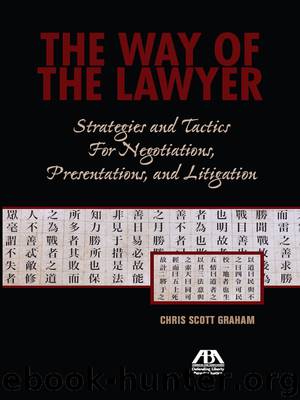The Way of the Lawyer by Chris Scott Graham

Author:Chris Scott Graham
Language: eng
Format: epub
ISBN: 9781614382027
Publisher: American Bar Association
Preparing extemporaneous comments in advance:
1. Maintains flexibility to leverage opportunity;
2. Values the ability to establish a theme by opening the opening;
3. Knows how to begin the ending to drive the theme in closure.
CHAPTER TWENTY-EIGHT
Garbage In Garbage Out
OPINIONS ARE ONLY AS GOOD AS THE FACTS on which they are based. When an expert witness has been provided inaccurate or incomplete information, it should come as no surprise when their opinions are successfully attacked. This relationship between input and output is not a phenomenon unique to experts. Communication at every level of an institution, from company reports to office gossip, and the validity of conclusions drawn from any source of data, can suffer from the same inherent flaws. Differentiating between honest opinions innocently based on bad facts and dishonest opinions that ignore contrary facts is not always easy to determine.
Once an opinion is developed, the person providing the opinion tends to defend their conclusions vigorously even in the face of facially contradictory information. While seemingly verifiable factual information would not appear to be susceptible to the same inadequacies as subjectively developed opinions, problems still exist. Because the methods available to gather and transmit information lack consistency there can be significant lags between the occurrence of an event and when the details become known to more than the few who were involved directly. Whether someone is offering an opinion as if based on concrete facts, or providing factual information as having been well documented, checking veracity and accuracy is not always an easy task.
While the internet and various forms of social networking have accelerated the pace of information transmission and the breadth of what is available, accurate details that exist behind the topical delivery of information is not always disseminated as thoroughly. The few public sources for information, whether in traditional hard copy or electronic form, are subject to manipulation by the personal political leanings of editorial staffs. Access to primary sources of research information, company reports, marketing materials, and financial analysis, is closely restricted and eye witness reports tightly controlled. Secondary sources for historical information, such as academic articles and investigative reports, traditionally available in library stacks and more recently in digitalized databases, do not uniformly appear on non-subscription based computerized listings. To the extent physical copies are still retained, they are not stored in easily accessible locations but instead are regulated either to long term storage or on microfiche rolls. Indexes of these historical materials barely exist, and the “search function” for those can consist of pouring through dusty files. Even use of a private investigator has a number of drawbacks. Once a commonplace tool to find evidence to impeach, with their ability to locate information seemingly unrivaled, the usefulness of some investigators (when asked to locate a witness or a piece of obscure information) has become increasingly redundant to searches commonly available over internet databases and both sources can be problematic when the intent is to use the information in a formal setting.
When tasked with challenging an opinion or the
Download
This site does not store any files on its server. We only index and link to content provided by other sites. Please contact the content providers to delete copyright contents if any and email us, we'll remove relevant links or contents immediately.
The Social Psychology of Inequality by Unknown(3031)
The Plant Paradox by Dr. Steven R. Gundry M.D(2625)
The Writing on the Wall by Anselm Jappe(2047)
Working for Yourself by J.D. (Nolo) Stephen Fishman(1873)
Get What's Yours for Medicare by Philip Moeller(1746)
Every Landlord's Legal Guide by Janet Portman & Stewart Marcia & Ralph Warner(1676)
The First 20 Hours: How to Learn Anything ... Fast by Kaufman Josh(1668)
ADHD on Trial by Michael Gordon(1579)
Decisive by Chip Heath(1570)
Working for Yourself by Stephen Fishman J.D. (Nolo)(1532)
Drafting Contracts: How and Why Lawyers Do What They Do, Second Edition by Stark Tina L(1499)
The Lord of the Rings: The Fellowship of the Ring, the Two Towers, the Return of the King by J. R. R. Tolkien(1442)
A Practical Guide to International Arbitration in London by Hilary Heilbron(1441)
Restitution by Restitution(1429)
The Economist Aug 8th 2015 by The Economist(1428)
Intellectual Property Strategy by John Palfrey(1426)
The Economist Aug 29th 2015 by The Economist(1395)
Collusion by Luke Harding(1325)
Persuasion by Owner(1300)
